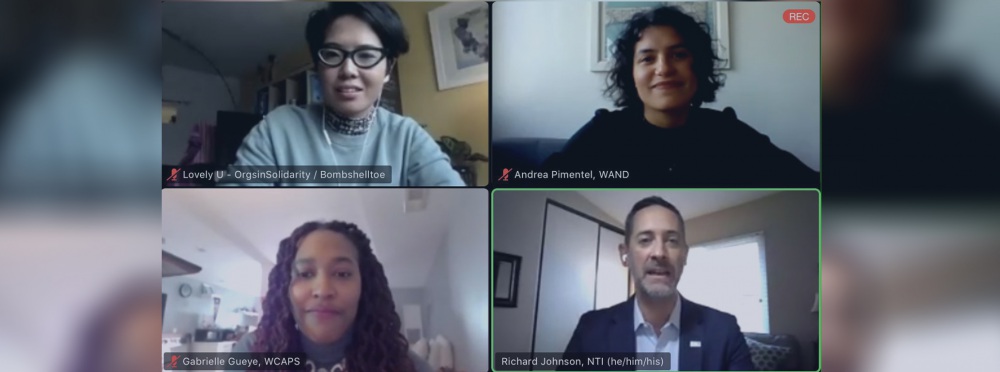Atomic Pulse
Empowering New Voices: Re-Envisioning Mentorship in the COVID Era

This post was written by Lindsay Bryda, an intern with NTI’s Materials Risk Management team. Lindsay is a Nonproliferation and Terrorism Studies masters candidate at the Middlebury Institute of International Studies and an IAEA Marie Sklodowska-Curie Fellow.
Establishing fruitful mentorship relationships can be challenging under the best of circumstances—but it’s even more difficult during a pandemic, when in-person meetings and get-togethers are impossible. Nine months into the COVID-19 crisis, organizations across the nuclear-security field say mentorship programs and relationships have suffered. However, “we are capable, if we want to, of intentionally building back that community through technology,” Andrea Pimentel of Women's Action for New Directions told participants earlier this month during a webinar hosted by Nuclear Threat Initiative (NTI), Women of Color Advancing Peace and Security (WCAPS), Women's Action for New Directions (WAND), BombShellToe, Organizations in Solidarity, and Gender Champions in Nuclear Policy.
The webinar, Empowering New Voices: Re-envisioning Mentorship in the COVID Era, brought together a diverse set of experts in nuclear policy and international security to lead a conversation around mentorship best practices in a virtual world. “Research has consistently shown that mentorship is the single most powerful influence on one’s professional development,” said NTI’s Deepika Choudhary. “Mentors provide access to networks, professional development opportunities, a social support system, and a lot more. It’s also key in developing a diverse, resilient talent pipeline and is pretty critical to employee retention and satisfaction.” For groups traditionally excluded from the field—women, black, indigenous, and people of color (BIPOC) and LGBTQ people—mentorship without intention can further exacerbate structural barriers that limit advancement and development, Choudhary added.
Gabrielle Gueye of WCAPS identified three strategies for finding a mentor: make use of formal mentorship programs like the WCAPS Mentorship Program, reach out to established connections, and cold call experts in the field via professional social networks like LinkedIn. While asking for advice or assistance may seem daunting, many people are surprised by how easy the process can be once past that initial hurdle. Working from home can even be an advantage at a time when people appreciate meaningful relationships and technology furthers accessibility.
But what qualities make an ideal mentor? Panelists stressed that a mentorship relationship does not have to be between a senior official and an entry-level staff member. Lovely Umayam of OrgsinSolidarity and BombShellToe noted that young professionals allow senior leaders to “see the world from a future foresight,” and stressed that peer mentors also can provide guidance and support. Prospective mentees should be on the lookout for mentors who inspire them, champion others, and value learning from different perspectives.
Both parties in a mentor-mentee relationship should recognize that a valuable relationship is the product of time and dedication. Richard Johnson of NTI also noted that “those of us who want to be mentors to women, to BIPOC people, and to LGBTQ people must recognize the different pathways that our mentees may travel… and how to be somebody’s champion even if you have not walked in their shoes.” Mentorship should extend beyond “resume talk” and allow the parties to share openly to receive honest feedback.
Panelists also emphasized that promoting a positive organizational culture is critical to fostering positive mentorship experiences. Participants were encouraged to advocate for formal mentorship programs and seek other ways to promote an open-minded work environment. Ensuring that new voices from diverse sources get heard requires established individuals to pick up the mantel—especially at a time when, as Choudhary said, “we’re living in a Zoom world, where it’s harder to grab coffee or run into someone at a professional event.”
For further information on mentorship best practices and resources, view Gender Champions in Nuclear Policy’s Mentorship Handbook.
Watch the webinar here.
Stay Informed
Sign up for our newsletter to get the latest on nuclear and biological threats.
